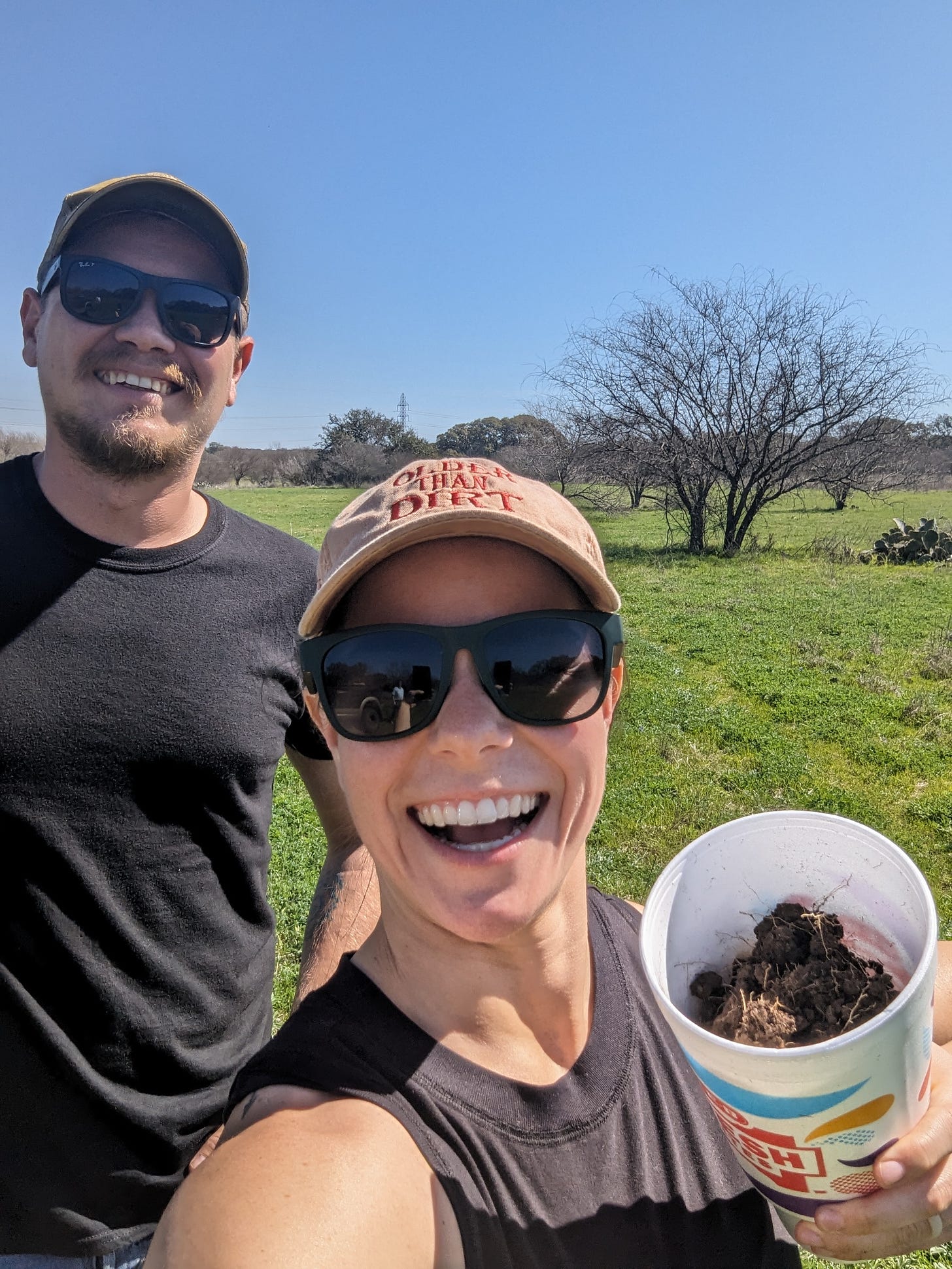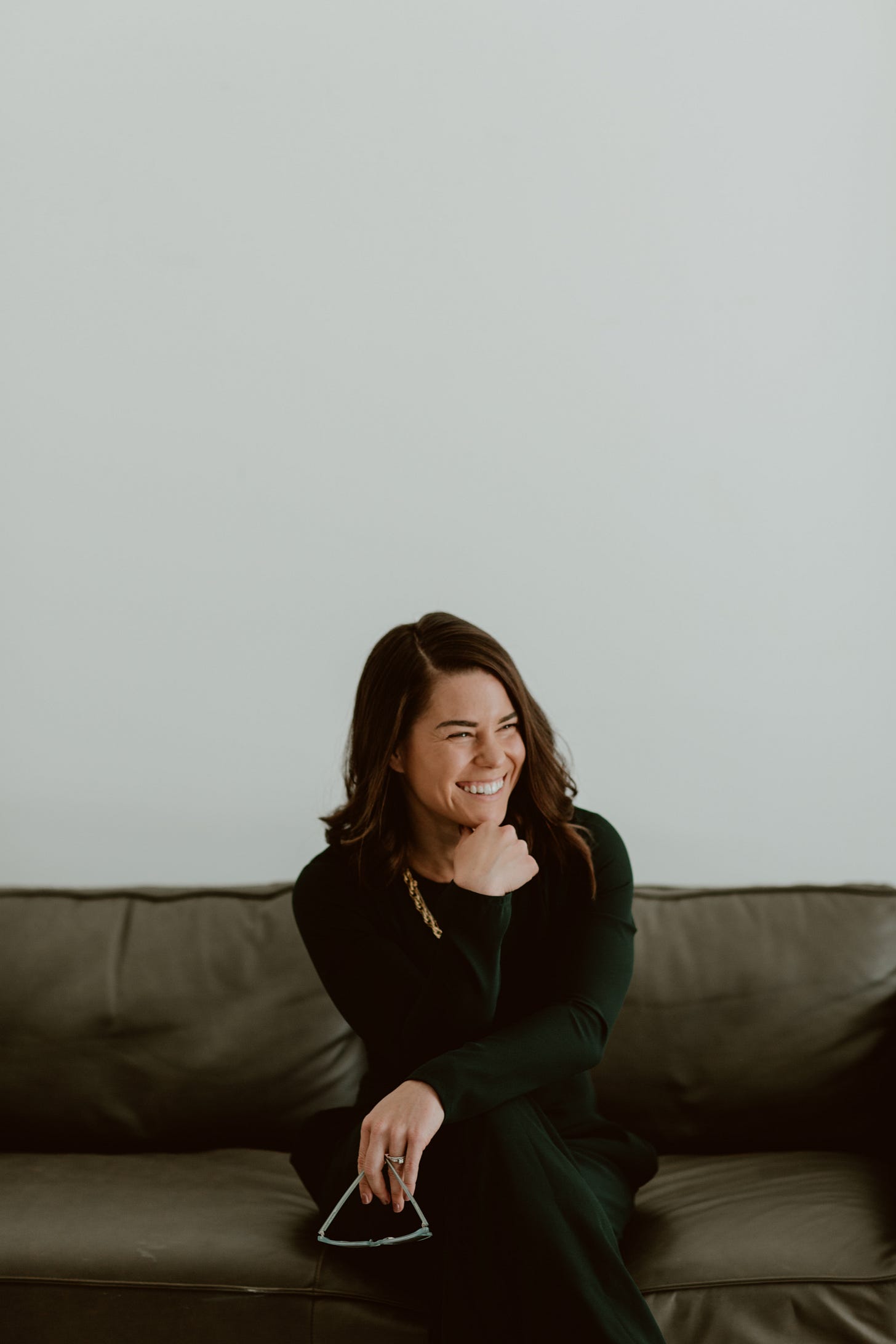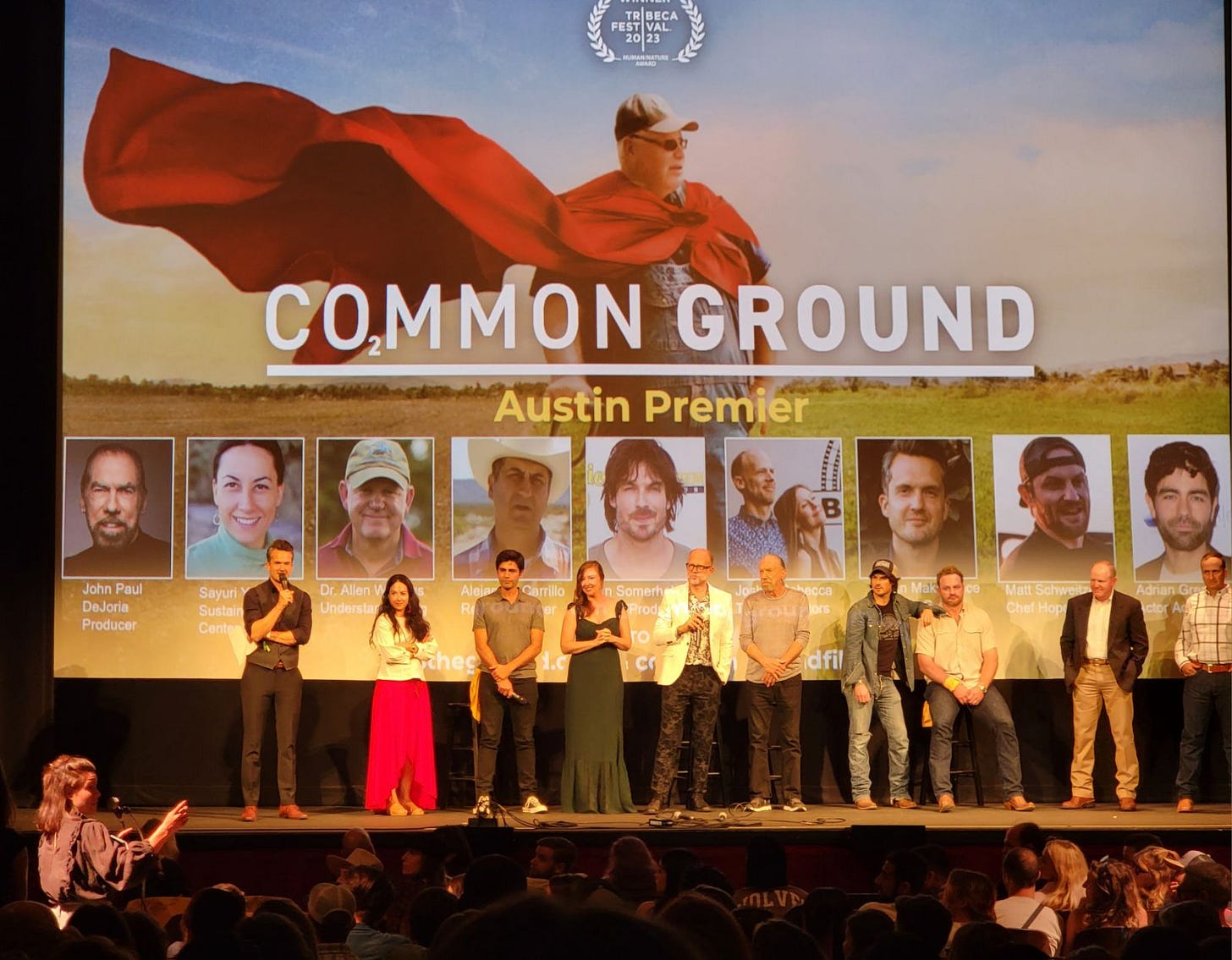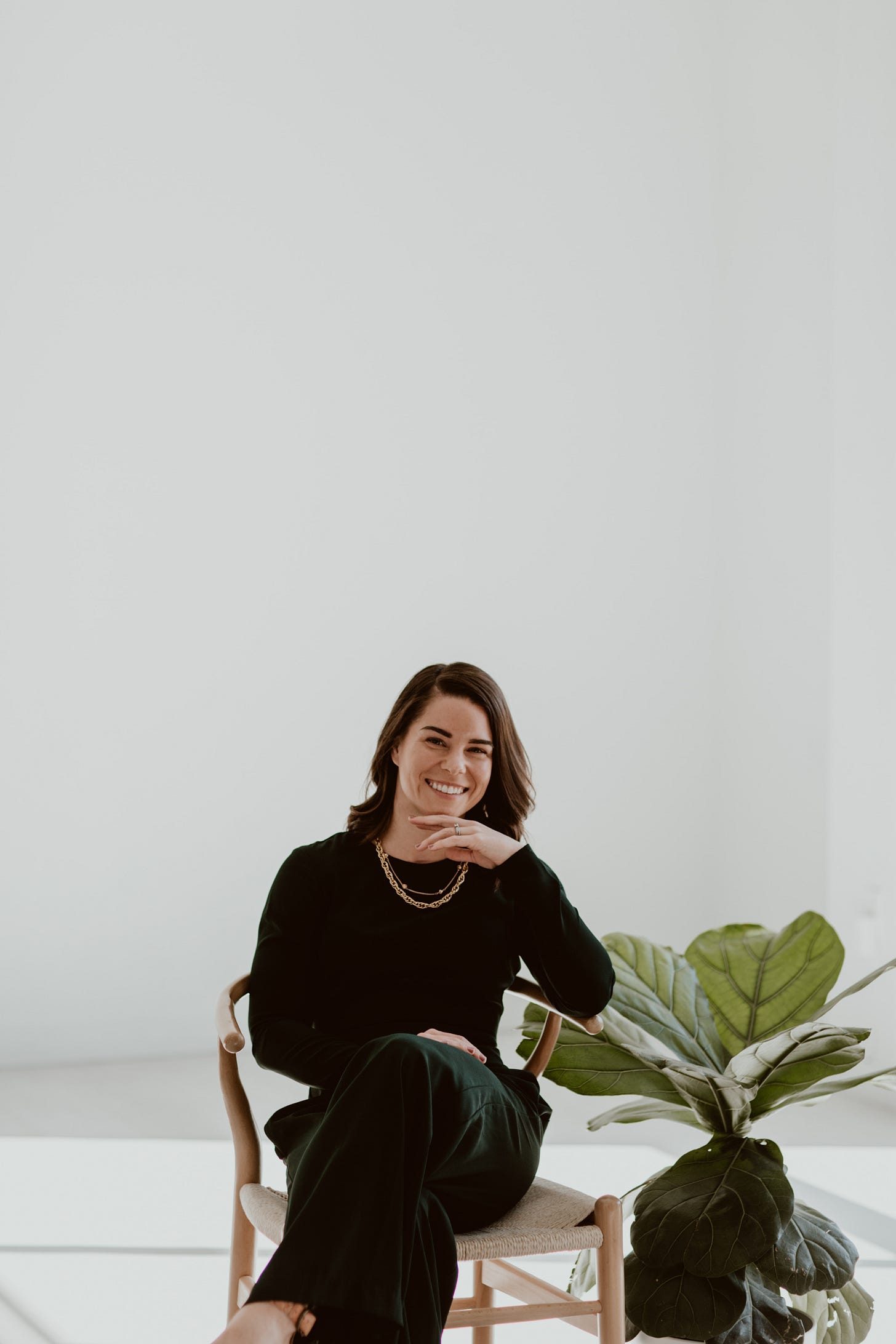Interview: Downland with Jessi Roesch
Today's guest is starting an accelerator program for regenerative land stewards 👏
A couple months back, a reader – someone genuinely engaged in our community (online and off!) – responded to one of my posts. In her casual commentary, she name-dropped some well-known leaders in regenerative agriculture, stating that they serve on the advisory team for her business, Downland. If this sounds cringe, I assure you it did not read as some gratuitous flex. Jessi Roesch (rhymes with ‘fresh’) is a real one – sincere, energized, and focused.
Jessi is taking part in the ‘soil-ution’ through the unexpected combination of her background in commercial finance with her passion for regenerative food systems.
Now, I understand some of you might be skeptical when it comes to the finance world and its ideas for agriculture. What sets Jessi apart is her acute awareness that she is not a farmer. You won’t find her oversimplifying agriculture, instead you’ll find her putting in countless hours volunteering on farms, building relationships with land stewards, and thoughtfully piecing together where her financial skills intersect with land regeneration.
After years of diligent research and planning, her vision is finally taking shape. Today, in this interview, we’ll delve into the full story of Downland, what they do and how it came to be.
Jessi! Thank you for being here.
First thing first, how would you describe Downland to someone you just met?
I’d say, we help the next generation of regenerative farmers & ranchers launch their operation by matching them with land, training and capital.
If I was talking to someone with a business background, I’d describe Downland as Y Combinator (a startup accelerator) for climate-smart farmers, or a franchise with more skin in the game.
We’re providing marketplace services. Similar to how Airbnb pairs someone who has supply (lodging) and someone who has demand (travelers), Downland will match a landowner with a regeneratively trained land steward. In this way, landowners and land stewards are the customers Downland aims to serve.
At its most basic, how does Downland work?
Aspiring ranchers & farmers apply to our residency program for training and community. We will match them with a landowner who is in need of land management. The farming resident, or land steward, can then move towards farm ownership and receive assistance from Downland in establishing their business entity. Downland acts as a holding company and earns income through a revenue share model.
I have more questions about the details, but before we dive in, tell us about yourself – what’s your professional background?
Most of my career has been spent in commercial finance, particularly commercial lending. Like many industries, finance and banking encompass many things – some areas I have experience in, others I don’t. I particularly know a lot about underwriting commercial loans.
Right out of college I worked for a couple big companies, like General Electric. I got to see how large-scale businesses work with all the various departments and levels of operation that make up a functional whole. The way big business transacts can be quite different than small business, so naturally the metrics that track success are complex and I found that interesting.
In 2018 I transitioned to working at start-ups! My husband was starting a new career in data science and we up and moved to San Francisco (from Cincinnati). It was a big move – I needed to find a job so I started the job hunt and during one interview the hiring manager asked, “How do you feel about taking risks?” to which I responded, “Well, I’m moving to San Francisco in 3 weeks whether I get this job or not”. I got the job and I’ve been in and around start-ups and small businesses ever since.
Would you say one resonates with you (your interests, skillsets) more than the other - big business or start-ups and small business?
From my experience, when the employee count reaches about 300 people, it starts becoming important for employees to “stay in their lane”, so to speak, and do the job they’re assigned to do with little to no crossover. This helps a business function efficiently and gives people clear expectations of what they’re supposed to spend time on. Lots of people appreciate this clarity! However, I find this kind of environment makes me bored very quickly.
One of the things I aim to do with Downland is to create a workplace where everybody can bring the whole of themselves and the variety of their skills.
I can relate to that, ha! Given your background and diverse perspectives you sound like the right woman to be creating a new business.
How did you get interested in regenerative agriculture?
My interest in where food comes from and healthy living goes way back.
Even as a young child I was very aware of my mortality. Then, when I was 16 and bought my first car, I was tasked with helping care for my grandparents. Seeing their decline in quality of life was a transformative experience. I knew I wanted to hedge against debility for myself as long as possible.
Part of my desire for a vigorous and healthy life is so I can do big and impactful things.
As an adult, I started stacking healthier habits through a series of basic epiphanies like, “I shouldn’t drink so much; I should sleep more and drink more water and not just eat granola bars from the cafeteria…” (anyone else?!)
These new habits accumulated into lifestyle shifts like learning how to cook and curiosities like, “what the heck is a patty pan squash and what can I do with it?” It’s that thread that has pulled me towards nutrient dense food and regenerative agriculture.
Another formative moment was when some friends of ours started a regenerative ranch in Seguin, TX. I remember visiting them and discussing carbon storage over dinner. I laugh at this now, but I left SO excited thinking I was the first person to have the genius idea of a carbon marketplace, ha!
Anyway, I kept down that path devouring books, articles, and any documentary on the topic. In fact, my first business idea for Downland, which technically still exists, was actually a Shopify app to allow online shoppers to purchase carbon offsets.
I love that you have found a way to pair your seemingly unrelated professional background with this mission that means so much to you personally.
Yeah! One of the things I think I bring as someone who is not a farmer is the ability to look at business structures outside of traditional Ag, and consider ways we can pull certain aspects into this context.
How did you iterate and take your ideas for Downland to where it is today, ready for its first round of funding?
I had Downland sitting in the background as a research project for a long time. As I learned new things, I’d just keep pulling on the thread to see where it would lead me next.
Somewhere along the way I started applying a problem-solving technique known as ‘first principles thinking’ which encouraged me to challenge assumptions through questions like: What barriers exist for the next generation of land stewards? Can venture capital solve any of these barriers?
It was through business accelerator programs that I was challenged to find truthful answers to fundamental questions like these. Prior to those programs I had been allowing market and venture signals guide what I was building rather than customers.
Real quick, for those unfamiliar, what is an accelerator program?
It’s basically a start-up bootcamp or training program. The level of intensity varies wildly; sometimes they’re free, other times you pay to be part of them or there may be equity-based funding available.
Part of my desire for a vigorous and healthy life is so I can do big and impactful things.
- Jessi Roesch, Downland
Back to your research phase for Downland, what were some pivotal moments during that time?
Upon discovering the statistic that an estimated 1.5 million farms and ranches are expected to change hands in the next couple of decades, I realized the urgency of engaging with both current landowners and those preparing to take on stewardship roles.
Early on someone told me, “if you don’t love talking to your customers, you’re in the wrong business”. Once I started interviewing people, I knew I was on the right path. I love talking to farmers, ranchers, and landowners. Their stories about why they do what they do and what their land means to them is so deeply personal.
Also, the USDA offered a similar program and had over 50,000 people express interest (and it would pay less than $30,000 / yr!). It’s been clear there is a need for something like Downland.
Many thought leaders and scholarly articles were saying regenerative farming can build profitable businesses so I figured, let’s do it!

Most of us know that farming can be a tough business, how has Downland evaluated that this is a worthwhile for-profit venture?
Great question. There are a few studies from University of Missouri, Michigan, and Minnesota that have helped inform the financial models we’re using. The University of Minnesota report on Organic Farm Performance in the Upper Midwest, has been the most informative. We’re estimating our potential conservatively (e.g. we assume lower profits than the averages reported for various farm sizes) and even still, Downland can make a healthy profit margin.
What’s most important to me is that the farms we establish are enduring and help create wealth and wellness in the communities where they exist and for the people that work there. The creation, ownership and growth of a business is a key component of that.
That’s not to say we won’t some day also have a non-profit, but for now we’re laser focused on leveraging business to power land regeneration.
Can you briefly explain how a revenue share model works?
In this case, the revenue generated from the farm, and costs associated, will be shared among the various parties and partners involved. This means everyone shares in the risks and rewards of the farm’s operation. This is why I say we’re kind of like a franchise with more skin in the game - Downland has incentive to ensure the long-term success of the farmer and will provide resources to support them.
How do you ensure land stewards make a living wage?
They will be a salaried employee of Downland with the goal of transitioning them to their own business entity with Downland. Furthermore, they may be shareholders in Downland which will serve as a wealth building opportunity.
What’s most important to me is that the farms we establish are enduring and help create wealth and wellness in the communities where they exist and for the people that work there.
-Jessi Roesch, Downland
How long will a land steward be on any one piece of land?
We aim to be really intentional in making a match that will last long-term. In theory, a land steward could remain on the land they’re paired with for several years and possibly become the owner of it.
This is important as it takes a lot of time to get to know the specifics of a particular place; it’d be hard to leave and start over somewhere else. I’m glad to hear y’all have thought about this.
Tell us more about funding, how does that work?
We have started our crowdfund on a platform called Wefunder - an SEC regulated type of fundraising.
Crowdfunding is a relatively new possibility. Prior to the 2012 Jobs Act, the only people who could invest in early-stage businesses would either be employees of that company who had received options or accredited investors (which requires various wealth-based criteria).
In short, investing was a rarified space. Platforms like WeFunder enable a new kind of investor, like friends and family, while still protecting them (from illegitimate companies, for instance) through SEC regulations.
Our crowdfund is open to friends and insiders (that’s you!) through the end of April, with access to preferred terms.
Once funding closes, what’s next?
I’m so excited for what’s next! The next several months will be focused on fundraising, and then we will start developing the educational and support piece which is where our advisory board of regenerative farming and ranching experts will really shine.
We already have target sites in central Texas for our first farm, so we will start conducting interviews and select our first farming resident (there’s currently a waitlist). Additionally, we have a few partnerships in the works with local wholesalers and are getting their input on products they’re interested in, which will be taken into consideration along with the context of the site.
The expectation is we’ll be kicking off our first growing season next spring.
Tell us about your team of advisors and their role in Downland!
The majority of our team is made up of agriculturalists or conservationists, plus a few experienced business advisors. We will be looking to these farming and ranching experts to help build out the educational and support piece of Downland.
How did you get connected with Allen Williams of Understanding Ag and the legendary rancher, Alejandro Carillo?
When the Common Ground film premiered in Austin at Paramount Theatre, they had a session at the end where they took questions from the crowd. I stepped up to the mic and asked, “What can businesses do to move the needle on soil health?”.
One of the panelists insisted I talk to Allen Williams and Alejandro Carillo. Of course, as the event wrapped they were being shuffled out quickly, nonetheless I tried to catch them. I was able to talk with both of them briefly and exchange contact info.
I’m so grateful to have them involved along with the rest of our advisory team, our farming residents will be in good hands!
How can people best support this effort?
Friends & insiders (that's you!) can invest in Downland via Wefunder before May 1st. Early investors have access to preferred terms.
Landowner Letter of Intent (LOI)*
*Landowners who may consider making their land available (in part or in whole) to a regenerative farming/ranching apprentice can share their interest using the form at this link. This is a non-binding letter of interest. The landowner will follow the link, enter their email address, then receive an email from DocuSign to complete the form. Think of this like a petition that Downland should exist and is helpful.
For more info, visit Downland’s website.
There you have it, friends. Help me in thanking Jessi for taking the time to share with us here! I hope her story inspires you to consider how your particular skills could be used in the movement towards better environmental stewardship 💫
Thank you for being here!










Hi Andie - I'm also a Substacker writer and I'm working on an upcoming book about opportunity and inequality in America. I just read this fantastic piece and saw that you have some friends in Seguin who doing some regenerative farm work? I'd love to be able to talk with them for the book and possibly highlight their story. Let me know if you think they'd be open to it and I can send more info your way.